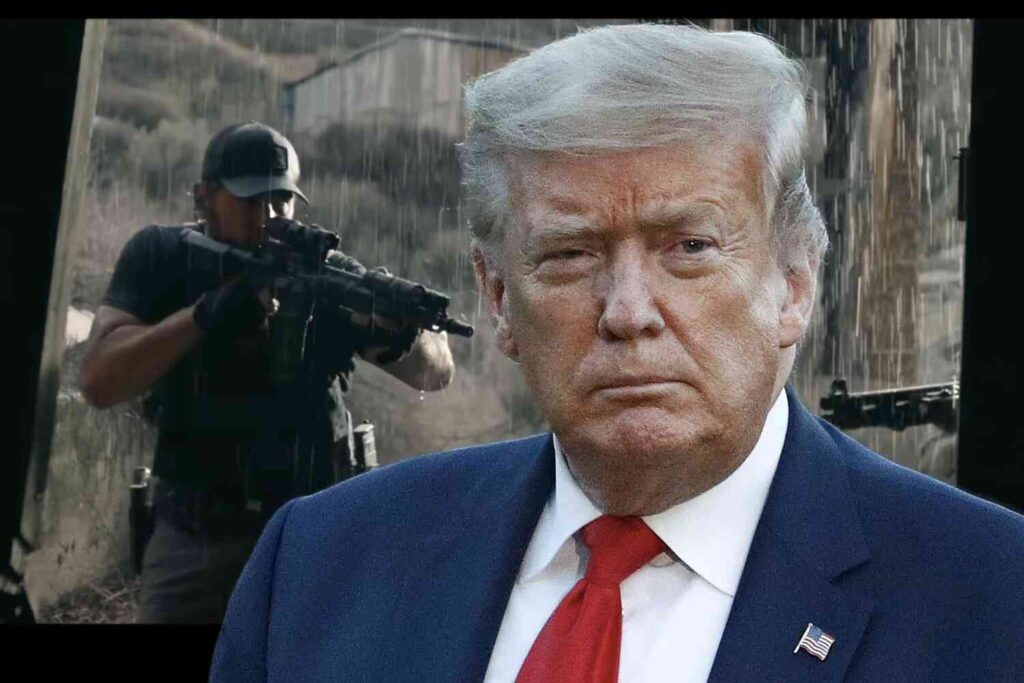A decree addressed to the Pentagon provides an official basis for undertaking direct operations in other countries, according to The New York Times.
New York – AGU 08 2025 – 08:55 CST

US Marines on the northern border of Tijuana, February 6, 2025. Jorge Duenes (REUTERS)
US President Donald Trump has ordered the Pentagon to use the armed forces to enforce the law against foreign drug cartels. The order issued by the Republican provides an official basis for undertaking direct military operations on foreign territory, and the corresponding territorial waters, against these organized criminal groups.
Trump secretly signed a directive to the Pentagon to begin using military force against certain Latin American drug cartels that the administration has designated as terrorist organizations, The New York Times reported Friday, citing sources familiar with the initiative.
The decision to involve the military is the most aggressive step yet in the government’s growing campaign against the cartels and underscores Trump’s determination to use military forces to carry out what until now had traditionally been police operations to curb the flow of fentanyl—a drug responsible for the worst addiction crisis in decades, and whose threat justifies tariffs on Mexico and Canada for the White House—and other illegal drugs into the country. According to anonymous sources cited by the newspaper, US officials have begun to develop options on how to pursue these groups, according to sources close to the talks who spoke on condition of anonymity.
Sheinbaum denies that the United States will intervene militarily in Mexico
The Republican administration is sparing no effort to combat drug trafficking, including offering a $50 million reward for the capture of Venezuelan President Nicolás Maduro, whom Washington links to the Sinaloa cartel and describes as «one of the world’s biggest drug traffickers.» But ordering the military to take strong action against drug trafficking abroad also raises legal questions, including the possibility that such action could result in civilian casualties—even suspected drug traffickers—at the hands of military personnel deployed in third countries.
It is Congress that must authorize the deployment of forces abroad in wartime situations, but it is unclear what the legal basis would be for more purely police operations such as dismantling a cartel or arresting its members.
At present, according to the newspaper, lawyers from the White House, the Pentagon, and the State Department have not made any public statements on the matter. It is also unknown whether the Office of Legal Counsel at the Department of Justice has issued an authoritative opinion determining the legal issues.
If the militarization of the fight against drug trafficking is confirmed, it would not be the first such initiative. Trump has deployed the National Guard and troops to the southwestern border this year to stem the flow of drugs and immigrants, and has ordered increased efforts to monitor and seize drugs. When he returned to the White House in January, he signed an order declaring drug cartels to be foreign terrorist organizations.
The president has particularly targeted Venezuelan and Mexican organizations. In February, the State Department designated Tren de Aragua, Mara Salvatrucha (known as MS-13), and other organized gangs as foreign terrorist organizations, which posed «a threat to national security beyond that posed by traditional organized crime.»

On the other hand, according to Reuters, the FBI has asked local police departments to report the names of individuals linked to drug cartels and gangs to the US government, so that they can be added to the terrorist watch list created after 9/11, which could mean the inclusion of US citizens on the list.
On May 9, the federal investigative agency sent an email to local law enforcement agencies asking them to share the names of suspects with ties to eight criminal groups that President Trump has designated as foreign terrorist organizations. It also asked law enforcement agencies to share information about family members and acquaintances of members of those groups.

The email, which was obtained by the NGO Property of the People—which advocates for transparency in public data—and shared with Reuters, was sent to other agencies and law enforcement groups, such as the National Sheriffs’ Association, which confirmed receiving it from the FBI.